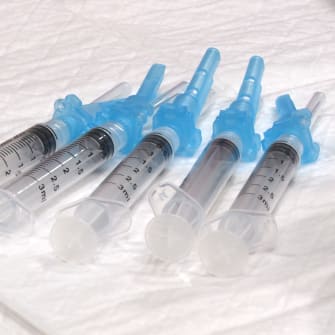
Health tips for college-bound teens, part one: Vaccines
While summer break is still at its peak, many high school graduates are preparing for the transition to college. As teens shop for dorm supplies, decide what to pack and fill out paperwork, there may be one important item missing from their to-do list — managing their health.
“College is a really wonderful time when teens start to spread their wings and explore and have new experiences,” says Mary Fairchok, MD, an infectious disease specialist at MultiCare Mary Bridge Children’s. “So you want to make sure they stay as healthy as possible because serious illnesses during this time can derail a student’s personal and academic life.”
In the first of this two-part series, learn what vaccines your soon-to-be college freshman should have before they leave home and why these vaccines matter.
What vaccines your college student should have
The Washington State Department of Health (DOH) requires children receive several vaccinations by the time they enter kindergarten, such as measles, mumps, rubella (MMR); polio; chickenpox and others. But what about older youth?
Here’s what vaccines they need before setting off for college and why they’re important.
Tetanus, diphtheria, pertussis booster (Tdap)
Adolescents should have received the Tdap booster at 11-12 years old, but if they didn’t, it’s not too late.
“One of the diseases this vaccine protects against is pertussis, also known as whooping cough,” Dr. Fairchok says. “Outbreaks of pertussis are common in the U.S. This disease is both very contagious and debilitating, often leaving people with coughs that last for weeks to months, which can be very disruptive for students trying to keep up with rigorous academics.”
Human papillomavirus (HPV) vaccine
This two or three-dose vaccine series protects against HPV, a common sexually transmitted infection that can cause cervical and penile cancers, throat cancer and genital warts. The number of doses depends on the age when the vaccine is first given. Recommended to begin at age nine, earlier HPV immunizations have shown to produce a higher immune response.
“College students tend to be sexually active, and even if they aren’t, rape and sexual assault unfortunately do sometimes happen on college campuses,” Dr. Fairchok says. “This vaccine is the best way to prevent HPV infections.”
Once acquired, this chronic infection can remain in the body for years. What many people don’t know, Dr. Fairchok adds, is that babies can even acquire HPV from their mothers during birth, which can cause warts to grow in and obstruct their respiratory tracts.
Stopping HPV before it starts can prevent significant health issues later in life for oneself and others.
Meningococcal vaccines
There are two types of meningococcal vaccines. Each vaccine protects against different strains of meningitis, a life-threatening infection that can be caused by viruses, bacteria or fungi.
“Meningitis due to meningococcus is rare, but outbreaks do happen, and students attending college are particularly vulnerable because college campuses have many people living together in close proximity,” Dr Fairchok says. “While meningitis can be treated, it tends to strike very swiftly and can be deadly even with appropriate treatment. Those who survive can suffer permanent disabilities.”
The Centers for Disease Control and Prevention recommends that all 11- to 12-year-olds receive the meningococcal conjugate (MenACWY vaccine) with a booster shot at 16 years of age.
Teens should also talk to their doctor or other health care provider about getting the serogroup B meningococcal (MenB vaccine). This vaccine is recommended for those with certain health conditions or those at increased risk for outbreaks — which includes most teens or young adults living in congregate settings like college dorms.
Flu and COVID-19 vaccines
Influenza outbreaks are common on college campuses, and those who get sick may fall behind on their studies and miss out on social activities. As flu season picks up this fall, it’s likely that cases of COVID-19 will increase as well.
“Most college students who get COVID-19 will likely have a mild to moderate infection, but there is also a risk of developing long COVID, when symptoms linger or new symptoms appear weeks or months after an initial infection,” Dr. Fairchok says.
These symptoms can include headaches, memory problems, difficulty thinking, fatigue and more, and can have a big impact on a student’s life and academic pursuits. COVID-19 vaccinations are effective at preventing serious infections, and some studies suggest that they protect against long COVID as well.
Now is the time to get annual flu shots and ensure your teen is up to date with COVID-19 vaccines.
Where to get vaccinations
It’s important to note that some colleges and universities require specific vaccinations. We recommend checking each institution’s vaccine policies and documentation requirements for incoming freshmen and returning students.
At MultiCare, we offer vaccines at our primary care clinics, retail pharmacies and at many Mary Bridge Children’s locations. Appointments may be required.
This article was originally published June 2023, and was updated in July 2024.